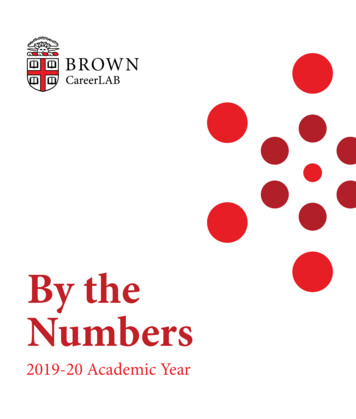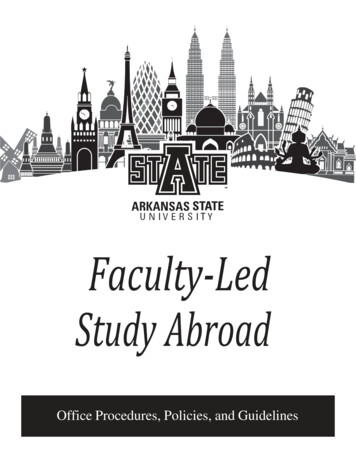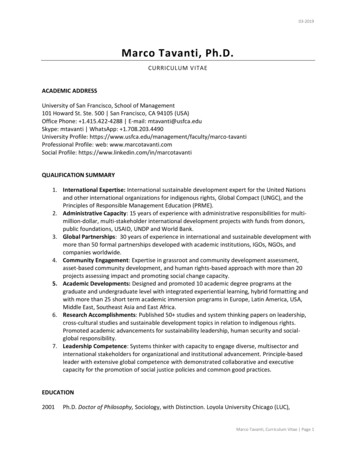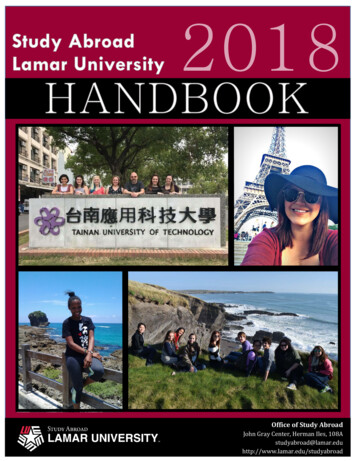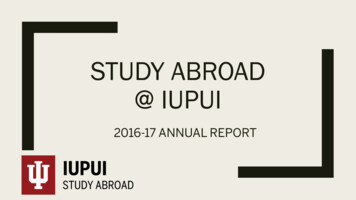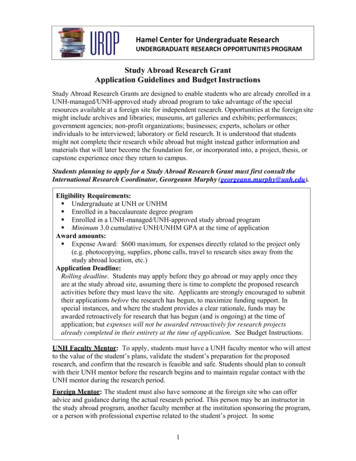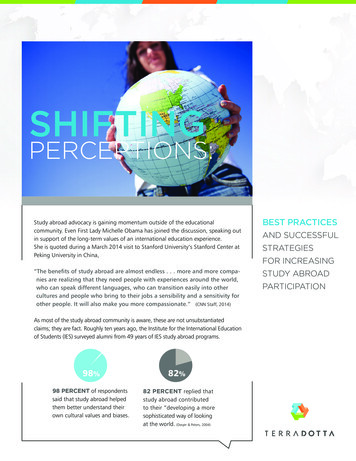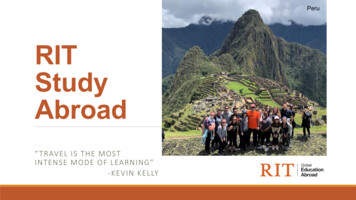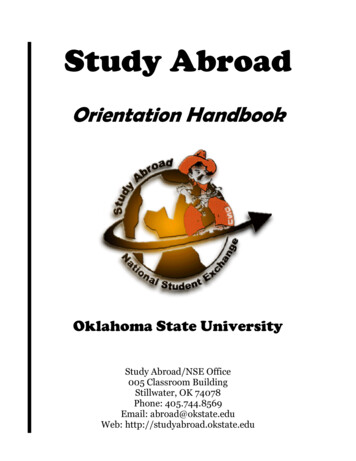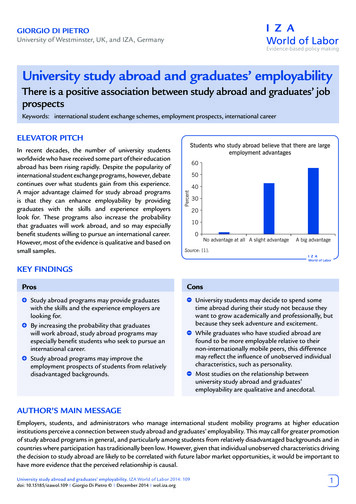
Transcription
Giorgio Di PietroUniversity of Westminster, UK, and IZA, GermanyUniversity study abroad and graduates’ employabilityThere is a positive association between study abroad and graduates’ jobprospectsKeywords: international student exchange schemes, employment prospects, international careerELEVATOR PITCHStudents who study abroad believe that there are largeemployment advantages605040PercentIn recent decades, the number of university studentsworldwide who have received some part of their educationabroad has been rising rapidly. Despite the popularity ofinternational student exchange programs, however, debatecontinues over what students gain from this experience.A major advantage claimed for study abroad programsis that they can enhance employability by providinggraduates with the skills and experience employerslook for. These programs also increase the probabilitythat graduates will work abroad, and so may especiallybenefit students willing to pursue an international career.However, most of the evidence is qualitative and based onsmall samples.3020100No advantage at all A slight advantageA big advantageSource: [1].KEY FINDINGSProsConsStudy abroad programs may provide graduateswith the skills and the experience employers arelooking for.By increasing the probability that graduateswill work abroad, study abroad programs mayespecially benefit students who seek to pursue aninternational career.Study abroad programs may improve theemployment prospects of students from relativelydisadvantaged backgrounds.University students may decide to spend sometime abroad during their study not because theywant to grow academically and professionally, butbecause they seek adventure and excitement.While graduates who have studied abroad arefound to be more employable relative to theirnon-internationally mobile peers, this differencemay reflect the influence of unobserved individualcharacteristics, such as personality.Most studies on the relationship betweenuniversity study abroad and graduates’employability are qualitative and anecdotal.AUTHOR’S MAIN MESSAGEEmployers, students, and administrators who manage international student mobility programs at higher educationinstitutions perceive a connection between study abroad and graduates’ employability. This may call for greater promotionof study abroad programs in general, and particularly among students from relatively disadvantaged backgrounds and incountries where participation has traditionally been low. However, given that individual unobserved characteristics drivingthe decision to study abroad are likely to be correlated with future labor market opportunities, it would be important tohave more evidence that the perceived relationship is causal.University study abroad and graduates’ employability. IZA World of Labor 2014: 109doi: 10.15185/izawol.109 Giorgio Di Pietro December 2014 wol.iza.org1
Giorgio Di Pietro University study abroad and graduates’ employabilityMOTIVATIONOne well-known aspect of globalization in the higher education sector is the rapidly risingshare of university students participating in study abroad programs. For instance, there isevidence that the number of students studying abroad has vastly increased in both Europe andthe US (Figure 1). Available data indicate that between academic years 1987/88 and 2011/12the number of students studying abroad through Erasmus (the EU’s flagship educationalexchange program for higher education students) rose from 3,244 to 204,744. Erasmus,which facilitates mainly intra-European student mobility, is not the only channel through whichEuropean students may temporarily study in another country. However, harmonized dataon participation in European study abroad programs other than Erasmus are unavailable.According to the Institute of International Education, in academic year 2011/12, 283,332US students studied abroad for academic credit, representing about a 484% increase sinceacademic year 1985/86.Figure 1. The numbers of US and European students studying abroad have risen enormously300,000Number of studentsErasmus studentsUS 994953/19921/1990/91998889197/1981985/860Source: Institute of International Education for US Students. Online at: Doors/Data/US-Study abroad/All-Destinations; European Commission for Erasmus Students. Online rasmus1112 en.pdfNot only are study abroad programs already widespread, but their popularity is expected toincrease. The European Commission recently launched the Erasmus for All program, whichoffers the possibility of studying abroad to many more students. More precisely, it will assistup to two million higher education students to study abroad over 2014–2020. In the US, theInstitute of International Education actively collaborates with colleges and universities andwith key public and private sponsors to boost the number and diversity of US students whostudy abroad.Given this rising trend, it is important to understand the potential benefits stemming fromstudy abroad. The claim is often made that study abroad programs help students betterprepare for the labor market. However, linking the effects of participation in study abroadprograms in a causal way to subsequent employment outcomes is challenging. Students whostudy abroad may differ from students who do not in unobserved characteristics that are likelyIZA World of Labor December 2014 wol.iza.org2
Giorgio Di Pietro University study abroad and graduates’ employabilityto affect labor market outcomes. Economists need to address this problem through studiesthat provide causal estimates of the effect of studying abroad on graduates’ employment.DISCUSSION OF PROS AND CONSPositive association between study abroad and employment prospectsNumerous studies have documented a positive association between participation in studyabroad programs and graduates’ job prospects. These studies rely on data from surveysof former participants in study abroad programs, information collected from internationalmobility managers at higher education institutions, and evidence from employer surveys.A few surveys have tracked the post-university outcomes of students who have spent partof their university studies abroad. Information from these surveys has been used to exploregraduates’ perceptions about how their study abroad experience affected their subsequentemployment career. For instance, one study examines data from a 2005 survey targeted toEuropean students who studied abroad during academic year 2000/01 through the EU’sErasmus program (the Professional Value of Erasmus survey, or VALERA survey). More thanhalf (54%) of surveyed students believed that their study abroad helped them secure their firstjob [2]. This suggests that the majority of former participants in international study programsconsider a period of studying abroad to be a positive addition to their résumé, one that helpsthem stand out in the labor market.Other studies are based on data provided by university international mobility managers. A2010 study, which relies on interviews with 11 mobility managers of different UK universities,concludes that participation in study abroad programs strongly enhances employability.One university international mobility manager was able to report results from a survey ofgraduates who had spent one year abroad during their university studies: 87% of respondentsstated that their experience abroad contributed to making their job interview more successful.Furthermore, 75% of respondents indicated that their current employer would be morelikely to offer a job to someone who had studied abroad. Another interviewee was told bya chief executive of Lloyds TSB that the company looks for global graduates when it recruitsemployees [3].Finally, some studies have examined the extent to which employers are attracted to applicantswho have studied abroad. Using data from a survey of 230 employers in the UK, a 2007 studyfinds that 29% of the employers felt that graduates with overseas study experience were moreemployable [4]. There is also evidence from Australia supporting the proposition that employershighly value graduates with overseas study experience. A 2006 survey of senior recruitmentand human resource managers from more than 100 Australia-based multinational, national,and state organizations (commissioned by the Queensland Government and the InternationalEducation Association of Australia) found that 60% of the respondents believed that experiencewith overseas study provides a “unique, competitive” advantage to a graduate’s résumé.Relevant employment skills acquired through study abroad programsStudying abroad may give students the opportunity to acquire a wide range of skills that enablethem to compete successfully in the labor market. Many internationally mobile students arelikely to become fluent in a second language. There is some evidence from the US that speakinga foreign language is rewarded in the labor market. Using a representative sample of US collegeIZA World of Labor December 2014 wol.iza.org3
Giorgio Di Pietro University study abroad and graduates’ employabilitygraduates, one study finds a 2–3% earnings premium for employees who are bilingual. Thisresult is robust to a variety of empirical strategies, including ordinary least squares regressionswith controls for cognitive ability and nonparametric methods based on propensity scorematching and panel data methods [5]. There are of course different premiums for differentlanguages. For instance, in the US, speaking Spanish as a second language does not pay offas much as speaking German does. Not only is fluency in a second language a crucial assetin an increasingly globalized economy, but plurilingualism is also known to bring cognitiveadvantages.Propensity score matchingWhen subjects are not randomly assigned to treatment and non-treatment groups, as isthe case with observational studies, other methods are needed to avoid the possibility ofselection bias. Bias can arise when apparent differences in outcome between treatment andnon-treatment groups can be attributed to characteristics that affected whether a subjectreceived a given treatment rather than simply to the effect of the treatment itself. Propensitymatching adjusts for such potential bias by creating a sample group of subjects who receivedthe treatment that is comparable on all observed characteristics to a sample of subjects thatdid not receive the treatment.Panel dataAlso known as longitudinal data or cross-sectional time series data, panel data are a data setin which the same entities (such as firms, individuals, and countries) are observed across time.Panel data allow researchers to control for omitted (unobserved or unmeasured) variables thatchange over time but not across entities as well as for time-invariant omitted characteristicsrelated to entities.While foreign language skills are often viewed as the most important benefit emerging fromstudy abroad, there are many other advantages. Intercultural competence and willingnessto be internationally mobile are likely to be highly valued in a global economy. Graduateswho have spent some time overseas during their university studies are more likely to workeffectively in a multicultural environment and may be more open to working in other partsof the world during their career. Former participants in student exchange schemes are likelyto be more flexible and open to change, enabling them to adapt to new situations, embracedifferent perspectives, and deal with ambiguity. Additionally, study abroad programs mayenhance students’ confidence and self-awareness. While studying and living abroad, studentshave to deal with new and unexpected situations, which can help them to become moreconfident, mature, and self-reliant. Finally, an overseas educational experience gives studentsthe possibility of building a network of international contacts and thus of expanding theiroptions of finding a job after graduation.Employment-related disadvantages of studying abroadWhile there are several reasons why study abroad is positively associated with graduates’ jobprospects, there are also some possible negative employment-related consequences of thisexperience. Some of the knowledge and skills that students acquire while studying abroad mayIZA World of Labor December 2014 wol.iza.org4
Giorgio Di Pietro University study abroad and graduates’ employabilitynot be transferable to the labor market in their home country. For instance, internationallymobile students may become familiar with accounting and legal procedures that are used inthe study abroad country but not in their home country.Another possible disadvantage associated with studying overseas is that not all graduatesare able to translate their study abroad experience into something employers value. In jobinterviews, employers sometimes get the impression that students pursue study abroad for thefun and excitement it offers rather than to pursue specific academic goals.There is also evidence that studying abroad may negatively affect the transition from highereducation to employment. Using data from 16 European countries, a recent study concludesthat internationally mobile students take slightly longer to find a job than do their peers whodo not study abroad [6]. However, this effect holds only for students who have spent at leastsix months abroad, and it is significant in a few countries and in a few subjects of study. Thisresult may be partly due to the greater difficulty of developing an employment network forstudents who are studying abroad. Participants in study abroad programs may find it harderto create and maintain social connections in their home country. Given that in many labormarkets jobs are often obtained through informal channels, internationally mobile studentsmay need to spend more time searching for a job. Another reason for the longer transition toemployment after graduation for internationally mobile students is that they are more likely tocontinue their studies than are their peers who did not study abroad.Study abroad and an international careerStudying abroad may be especially beneficial for students who are willing to pursue aninternational career. Many students decide to study abroad because they view this experienceas an opportunity to develop an internationally oriented career. However, not all participantsin international student mobility programs are determined to pursue a globally oriented careerbefore they go overseas. An education abroad experience may actually induce some studentsto do so.Several studies report that former participants in study abroad programs are more likely tobe employed in multinational companies and work overseas than their non-internationallymobile peers. A survey conducted by the Institute for the International Education ofStudents found that nearly half (48%) of US students who studied abroad during at leastpart of their university years reported working in a globally oriented position at some pointafter graduation. Similar evidence for European students emerges from the VALERA survey.Graduates who studied abroad through the Erasmus program are more likely than otherstudents to work in internationally oriented organizations and carry out work tasks with aninternational component [7]. More precisely, compared with workers who had no internationalstudy experience, former Erasmus participants are more likely to be sent abroad for workassignments, more likely to travel to other countries on business, more likely to use foreignlanguages in professional situations, more likely to use information about other countries intheir work, and more likely to work with colleagues or clients from other countries.A few studies provide causal evidence of the positive influence of participation in internationalstudent exchange programs on graduates’ likelihood of working in a foreign country. Twoof these studies, which rely on a similar identification strategy, look at German and Italiangraduates [8], [9]. The German study focuses on the effect of the Erasmus program, whilethe Italian study analyzes the impact of all student exchange schemes. The two studies reachIZA World of Labor December 2014 wol.iza.org5
Giorgio Di Pietro University study abroad and graduates’ employabilitysimilar conclusions: studying abroad increases the likelihood of later working abroad—by 15percentage points for German students and by 18–24 percentage points for Italian students—compared with students who have not studied abroad. Another study using data on Dutchuniversity students uses a regression discontinuity design (a quasi-experimental study designused to determine the causal effects of social programs or interventions when randomizationis not feasible; it compares observations that lie close to both sides of a predeterminedthreshold to estimate the local average treatment effect) to account for the endogeneity of thedecision to study abroad [10]. The empirical findings suggest that studying abroad raises theprobability of working in a foreign country by approximately 50 percentage points. There aretwo possible reasons for the wide differences in the magnitude of the effect related to studyingabroad. First, while the German [8] and Italian [9] studies use a nationally representative surveyof university graduates, the Dutch study [10] employs a small sample of particularly talentedstudents. Second, the German and Dutch studies examine the impact of undergraduatestudies abroad, while the Dutch study investigates the effect of postgraduate studies abroad.In line with expectations, there is also evidence that the probability of working abroad followinggraduation is positively related to the duration of the international study experience. The moretime spent studying at a foreign university, the higher is the likelihood of later having a job ina foreign country. One study finds that for European students who spent 12 months abroad,the probability of working in a foreign country within five years of graduation is more than thedouble that of their peers who studied abroad for three months [6].Finally, there is descriptive evidence from Germany that internationally mobile graduates tendto return to the country where they studied abroad [8]. The reason for this choice is that whilestudying abroad students are likely to acquire skills and knowledge (such as language skillsand personal contacts) that are generally more relevant in that labor market than elsewhere.Accounting for unobserved characteristics of students who study abroad maybe relevantA major challenge of research investigating the employment effect of studying abroad is thatit should account for the possibility that unobserved individual characteristics driving thedecision to participate in international student exchange schemes might be correlated withsubsequent employment outcomes. There are at least two sets of arguments suggesting thatstudents who study abroad are weaker on unobserved dimensions that may be related tofuture labor market opportunities. First, many students decide to study abroad not becausethey want to gain competence in academic and professional domains but because they arelooking for adventure and excitement. Second, it is also possible that some students viewthe experience as an opportunity to put less effort into their education since examinationstend to be easier in study abroad programs. International exchange students may receivespecial treatment, which can improve their odds of passing exams and getting higher grades.Additionally, students may intentionally choose study abroad programs with lower examinationstandards than their home university. For example, in one Italian university several studentexchange links with international higher education institutions were suspended following aninvestigation that found that many students were choosing these destinations because of theirlower examination standards.On the other hand, the decision to spend some time abroad during university studies can beassociated with unobserved student traits that positively affect labor market outcomes afterIZA World of Labor December 2014 wol.iza.org6
Giorgio Di Pietro University study abroad and graduates’ employabilitygraduation. In line with this consideration, one study, using data from a large sample of firstyear US college students, finds that the intention to study abroad can be positively predictedby factors such as openness to diversity in ideas and people, interest in writing and reading,diverse interactions while in college, and participation in extracurricular activities [11].LIMITATIONS AND GAPSEvidence on the positive association between participation in international student mobilityschemes and graduates’ employment prospects comes mainly from anecdotal and qualitativestudies. With only a few exceptions [8], [9], [10], the studies discussed here do not accountfor the possibility that the decision to study abroad may reflect unobserved (or difficult orimpossible to measure) individual characteristics that are likely to be correlated with futureemployment prospects. This means that these studies are unable to separate the effect onfuture employment outcomes triggered by participation in study abroad programs from theeffect of unobserved individual characteristics driving the decision to study overseas. Since,as discussed above, these omitted factors could have either a positive or a negative impacton employment (selection into study abroad programs can be positive or negative), theconclusions of the studies mentioned above may overestimate or underestimate, respectively,the true employment effect of studying abroad. Given the substantial amount of publicresources devoted to study abroad programs, it is important to identify the true impact ofthese programs on job prospects by conducting more studies that can also account for thepossibility that the decision to study abroad may reflect unobserved individual characteristics.To the best of this author’s knowledge, only one study has attempted to examine the causal effectof studying abroad on graduates’ subsequent employment probability [12]. The identificationstrategy uses students’ exposure to international exchange programs as a source of exogenousvariation in the probability of studying abroad. This study concludes that Italian graduateswho have studied abroad as part of their degree are approximately 23 percentage points morelikely to be in employment three years after graduation relative to their non-internationallymobile peers. Given that Italian students who study abroad may have different preferencesand personality traits than similar students in other parts of the world, more comparativestudies are needed on the causal employment effect of studying abroad. Not only is suchadditional causal evidence necessary before any generalizations can be made, but it could alsohelp international, regional, national, and local institutions make more informed decisionson whether to support initiatives to encourage cross-border student mobility. Furthermore,this evidence may help parents and students, for whom studying abroad often represents asubstantial investment.SUMMARY AND POLICY ADVICEThere are many potential advantages associated with participation in study abroad programs.One is that an international education experience may enable students to acquire a vast arrayof skills that can help them find a job once they enter the labor market. It may be especiallyhelpful to students who are interested in pursuing globally oriented careers. The employmentadvantage of studying abroad is recognized by participating students, employers, and mobilitymanagers of higher education institutions.The large amount of qualitative and anecdotal evidence that studying abroad pays off inthe labor market provides some support for initiatives aimed at increasing the number ofIZA World of Labor December 2014 wol.iza.org7
Giorgio Di Pietro University study abroad and graduates’ employabilityparticipants in such programs. For instance, the EU’s Erasmus for All program recognizesthe importance of helping young people acquire training and skills that can increase theirpersonal development and improve their job prospects. However, such initiatives shouldbe accompanied by provisions to raise students’ awareness of the benefits of an overseasexperience.Such awareness-raising measures should be targeted especially to students from relativelydisadvantaged backgrounds. On the one hand, these students are less likely to receive relevantinformation about the advantages of studying abroad from their parents and friends. Onthe other hand, an international education experience may significantly improve their labormarket prospects. It may provide them with an opportunity to develop many marketable skills(such as intercultural competence, global awareness, and foreign language skills) that theirbackground would not otherwise have exposed them to. Of course, appropriate financialsupport should be given to students from relatively disadvantaged backgrounds to help themafford studying abroad. However, more than financial barriers prevent this group of studentsfrom studying overseas. Cultural factors, such as negative family attitudes toward the valueof international experience, may play an important role in discouraging the participation ofstudents from relatively disadvantaged backgrounds in study abroad programs.Another advantage of interventions that encourage students from relatively disadvantagedbackgrounds to study abroad is that such interventions may slow the growth of inequality. Avery large proportion of Erasmus participants have parents with a higher education, and thisshare has not changed much over time [13]. Given that students from relatively advantagedbackgrounds are more likely to take up study abroad opportunities, this experience may furtherenhance their labor market position compared with students from relatively disadvantagedbackgrounds. These interventions could also reduce inequality if returns from an internationalexperience are higher for students from more disadvantaged backgrounds than for studentsfrom less disadvantaged backgrounds.At the same time, it is important to increase awareness of the benefits of studying abroadamong students in countries where participation in international student exchange programsis comparatively low. For example, the share of Erasmus students as a percentage of thegraduate population is much lower in the UK than in other European countries (Figure 2).In addition, internationally mobile students in the UK are disproportionately young, female,white, and from more advantaged socio-economic backgrounds [3]. Therefore, study abroadprograms in the UK should be promoted especially among students who are mature, male,from ethnic minorities, and from more disadvantaged backgrounds.PercentFigure 2. The share of Erasmus students in the graduate population is lower in the UKthan in other selected European countries, nce2009/102010/11SlovakiaItalySource: European Commission, Erasmus program. Online dents.phpIZA World of Labor December 2014 wol.iza.org8
Giorgio Di Pietro University study abroad and graduates’ employabilityIt is also important to let students know that the employment benefits related to studyingabroad accrue not only to students pursuing a specialist language degree, but also to studentspursuing other courses of study. For example, in the UK a large proportion of students studyingabroad are language specialists. In the academic year 2011/12, nearly 58% of outgoing UKstudents in the Erasmus program studied languages and philological science (Figure 3). Thisfinding suggests that many UK non-language students are deterred from studying abroad by alack of foreign language skills. Several measures could be taken to address this obstacle. First,students can be informed that they could benefit from an international mobility experienceeven if they are not fluent in the relevant language when they start out. Second, higher educationinstitutions could allocate more resources to language centers or extracurricular coursesprovided by language departments. Third, foreign languages could be made compulsory atboth primary and secondary school.Figure 3. A majority of Erasmus students from the UK pursued language studies abroad,2008/09–2011/12Number of 24,0003,0002,0001,0000Languages andPhilologicalScienceBusinessStudies andManagementSocial StudiesLawArt and DesignSource: British Council. Online outgoing uk erasmus student mobility by subjectarea - 2007 to 2011.pdfFinally, many institutions, students, and parents are making decisions about study abroadprograms based on their beliefs that the programs improve the employment prospects ofparticipants. While correlational and anecdotal studies all point in that direction, more causalstudies are also needed to confirm these impacts and their size.AcknowledgmentsThe author thanks two anonymous referees and the IZA World of Labor editors for manyhelpful suggestions on earlier drafts.Competing interestsThe IZA World of Labor project is committed to the IZA Guiding Principles of Research Integrity.The author declares to have observed these principles. Giorgio Di PietroIZA World of Labor December 2014 wol.iza.org9
Giorgio Di Pietro University study abroad and graduates’ employabilityREFERENCESFurther readingCrossman, J. E., and M. Clarke. “International experience and graduate employability: Stakeholderperceptions on the connection.
University study abroad and graduates' employability There is a positive association between study abroad and graduates' job prospects Keywords: international student exchange schemes, employment prospects, international career KeY FiNDiNGS Students who study abroad believe that there are large employment advantages Percent 60 50 40 30 20 10 0

